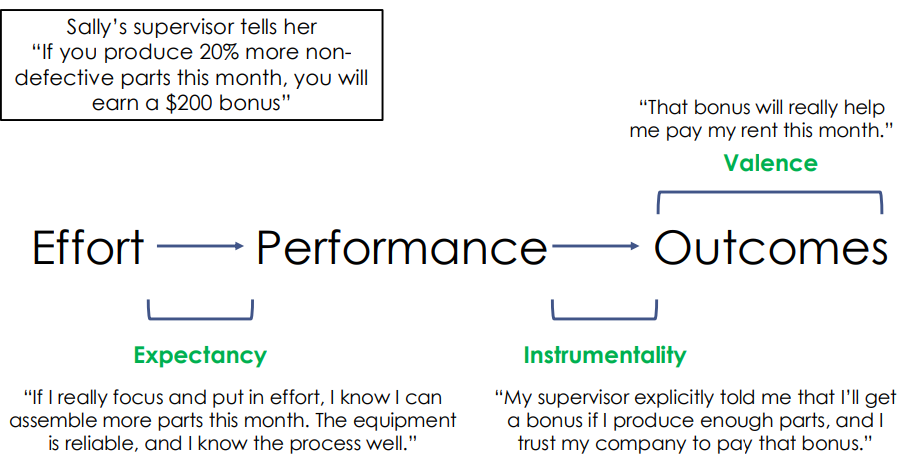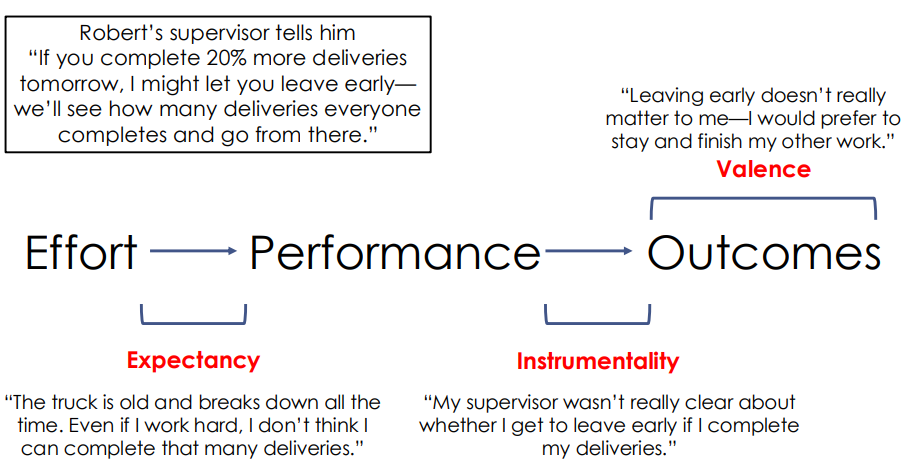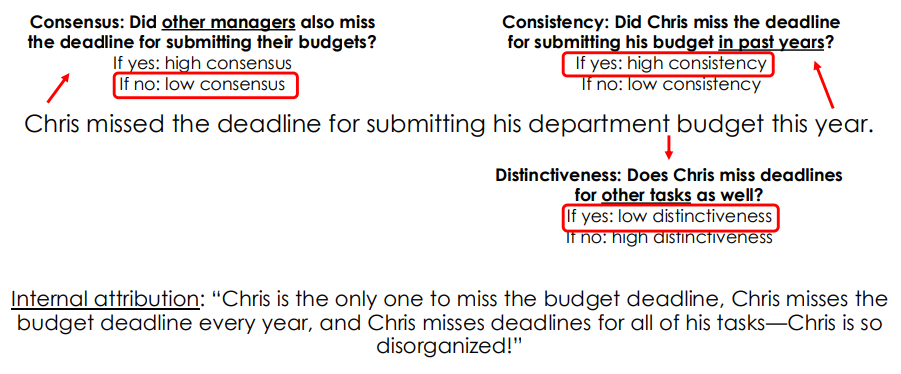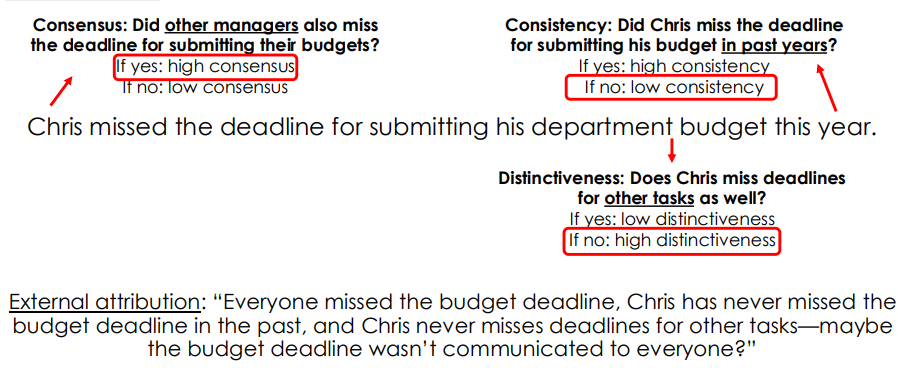extra study help
1/21
There's no tags or description
Looks like no tags are added yet.
Name | Mastery | Learn | Test | Matching | Spaced |
|---|
No study sessions yet.
22 Terms
Expectancy theory
Sally’s supervisor tells her “If you produce 20% more nondefective parts this month, you will earn a $200 bonus”

Expectancy theory
Robert’s supervisor tells him “If you complete 20% more deliveries tomorrow, I might let you leave early— we’ll see how many deliveries everyone completes and go from there.”

Example 1
Emma, a teaching assistant, is told that if she completes her essay marking on time, she can leave early on Friday. Emma knows that she can focus enough to get the marking completed. And, her boss was clear that she can leave early on Friday if she completes the marking. However, leaving early isn’t important to her because she has other tasks to complete.
Attribution
Chris missed the deadline for submitting his department budget this year.
Internal attribution: “Chris is the only one to miss the budget deadline, Chris misses the budget deadline every year, and Chris misses deadlines for all of his tasks—Chris is so disorganized!”

Attribution
Chris missed the deadline for submitting his department budget this year
e
External attribution: “Everyone missed the budget deadline, Chris has never missed the budget deadline in the past, and Chris never misses deadlines for other tasks—maybe the budget deadline wasn’t communicated to everyone?”

example 2
Emma, a teaching assistant, just met the deadline to submit essay marks. She always meets the deadlines to submit her essay marks, so the professor isn’t surprised. In addition, the other teaching assistants also met the deadline to submit their essay marks. Interestingly, Emma often misses deadlines for submitting her weekly hours worked.
Bernard is a Grade 11 social science teacher, and he is feeling stressed. His students have been asking for fewer group projects, but the school board expects more group projects. He has been asked to teach some psychology topics that sound interesting but that he’s not familiar with. The photocopier at the school has broken down constantly this week while Bernard has been photocopying exams. And, he has been busy renovating his basement at home.
(a) There are 2 non-work stressors in this scenario.
(b) There are 2 work hindrance stressors in this scenario.
(c) There are 3 challenge stressors in this scenario.
(d) There is 1 hindrance stressor in this scenario.
(e) There is 1 example of personal development in this scenario.
(b) There are 2 work hindrance stressors in this scenario.
Bernard copes with the stressors that he is experiencing by first thinking about how he could be more efficient at his work. Then, he asks one of his colleagues for help understanding the psychology topics that he is struggling with. Finally, while attempting to use the broken photocopier, he kicks the photocopier in frustration. What we can say about this scenario is that:
(a) There are 2 examples of problem-focused coping in this scenario.
(b) There are 2 examples of emotion-focused coping in this scenario.
(c) There are 2 examples of cognitive coping in this scenario.
(d) There are 3 examples of behavioural coping in this scenario.
(e) There are 3 examples of problem-focused coping in this scenario.
(a) There are 2 examples of problem-focused coping in this scenario.
Perhaps because of the stress that Bernard has been experiencing, he has had a lot of stomachaches and headaches lately. He reflects upon the fact that he has been angry and irritable with his coworkers as well. While at a dentist appointment, the dental hygienist noted that Bernard seems to be grinding his teeth a lot. While at a doctor’s appointment, his doctor noticed an increase in Bernard’s blood pressure. How many psychological strains is Bernard experiencing?
(a) Zero
(b) One
(c) Two
(d) Three
(e) Four
(c) Two
The school board that Bernard is working for recognizes the stress that its teachers have been experiencing. A meeting takes place to discuss ways to manage stress. Some suggestions put forward are to allow work-from-home, to provide time management training, and to offer meditation workshops. Which of the above stress management techniques are categorized as techniques that “reduce stressors”?
(a) Meditation workshops
(b) Work-from-home and time management training
(c) Meditation workshops and time management training
(d) Meditation workshops, work-from-home, and time management training
(e) None of the above are techniques that reduce stressors
(e) None of the above are techniques that reduce stressors
Example
Expectancy theory applied in a Virginia bank
• Tellers were averaging only 3 new Visa customers per month
• Bank wanted to increase number of Visa applications for each teller
• Tellers were told they would receive $5/month extra if they increased the number of new Visa customers per month to 25
Do you think the tellers were motivated? Why or why not?
• Expectancy was low: even with hard work, tellers didn’t believe that they could generate 25 new customers.
• Instrumentality was high: tellers were aware that they would receive $5/month when 25 customers were generated.
• Valence was low: most tellers did not place much value on $5/month.
Holly works in dental equipment sales. Her manager told her that if she sells 10 sterilizing machines in August, she will earn a $500 bonus. Because many dental clinics are closed for summer holidays in August, Holly knows that there is no way she can sell 10 sterilizing machines. She would really like to receive the bonus, as she just finished school and has student loans to pay off.
Do you think Holly was motivated? Why or why not?
• Expectancy was low: “Holly knows that there is no way she can sell 10 sterilizing machines”
• Instrumentality was high: “Her manager told her that if she sells 10 sterilizing machines in August, she will earn a $500 bonus”
• Valence was high: “She would really like to receive the bonus”
David and Jaycee make gourmet jams and jellies. This week, they were able to make 80 jars of strawberry kiwi jam and 40 jars of blueberry pomegranate jam. According to goal-setting theory, what would be a good goal to set for David and Jaycee next week?
(a)Make as many jars of jam as possible.
(b)Make 80 jars of strawberry kiwi jam.
(c) Make 90 jars of strawberry kiwi jam.
(d)Make 35 jars of blueberry pomegranate jam.
(e) Make 350 jars of blueberry pomegranate jam.
(c) Make 90 jars of strawberry kiwi jam.
David and Jaycee each made 60 jars of jam. Jaycee is given a $20 bonus, while David is given a $10 bonus for the jams that they made. Which of the following may result in this scenario?
(a) Jaycee may think about stealing from her organization.
(b)David may feel a sense of guilty and anxiety.
(c) Jaycee may think to herself “I am more talented and make better jams than David”
(d)David may put in greater intensity and persistence of effort.
(e) Jaycee may put in less intensity and persistence of effort.
(c) Jaycee may think to herself “I am more talented and make better jams than David”
Trust propensity is defined as:
(a)Trust rooted in a rational assessment of the authority’s trustworthiness.
(b)A belief that the authority wants to do good for the trustor.
(c)A perception that the authority adheres to a set of values and principles that the trustor finds acceptable.
(d)The willingness to be vulnerable to an authority because of positive expectations about the authority’s actions and intentions.
(e)A general expectation that the words, promises, and statements of individuals can be relied upon.
(e)A general expectation that the words, promises, and statements of individuals can be relied upon.
With respect to the procedural justice rules, which of the following is the best example of voice?
(a)Students are allowed to appeal an essay grade.
(b)Student essays are graded by a knowledgeable TA.
(c)Students can provide input into curriculum development.
(d)TAs mark student essays without knowing the student’s name.
(e)University committees contain student reps from each department.
(c)Students can provide input into curriculum development.
Louis just realized that he made an error in calculating his employee’s performance appraisal score. The employee should have received a much higher score than Louis reported to HR. In deciding whether to correct his error, Louis thinks “I should report my mistake because my coworkers will think I’m a bad leader if I don’t”. Louis is most likely at the ___ stage of cognitive moral development.
(a)principled
(b)post-conventional
(c)moral identity
(d)conventional
(e)preconventional
(d)conventional

A

C
Stanley works for a marketing firm. He is often asked to give presentations to clients. Today, Stanley’s presentation was not very good. This is surprising, because Stanley usually gives good presentations to clients. And, Stanley excels at the presentations that he gives as a volunteer at the local museum and the presentations that he gives to other departments in the company. Kate and Ben, who presented alongside Stanley today, also did not provide good presentations.
Is Stanley’s manager likely to make an internal or an external attribution? External attribution:
Low consistency, high distinctiveness, high consensus
Tina was absent from work today—yet again. It’s her sixth unexcused absence so far this month. In fact, absenteeism has been a problem for Tina for quite some time. She was absent a lot at her previous job. She also tends to be absent from the monthly departmental meetings at her current job. None of Tina’s coworkers were absent today.
Is Tina’s manager likely to make an internal or an external attribution? Internal attribution:
High consistency, low distinctiveness, low consensus
Which of the following best illustrates a behavioural description interview question?
a) “What would you do if you were asked to perform a task you’ve never done before?”
b) “Describe a time when you had to do something that you weren’t trained to do. How did you handle it?”
c) “What would you do if you made a mistake that nobody at work noticed?”
d) Both (a) and (c) are behavioural description questions
e) All of (a), (b) and (c) are behavioural description questions
b) “Describe a time when you had to do something that you weren’t trained to do. How did you handle it?”